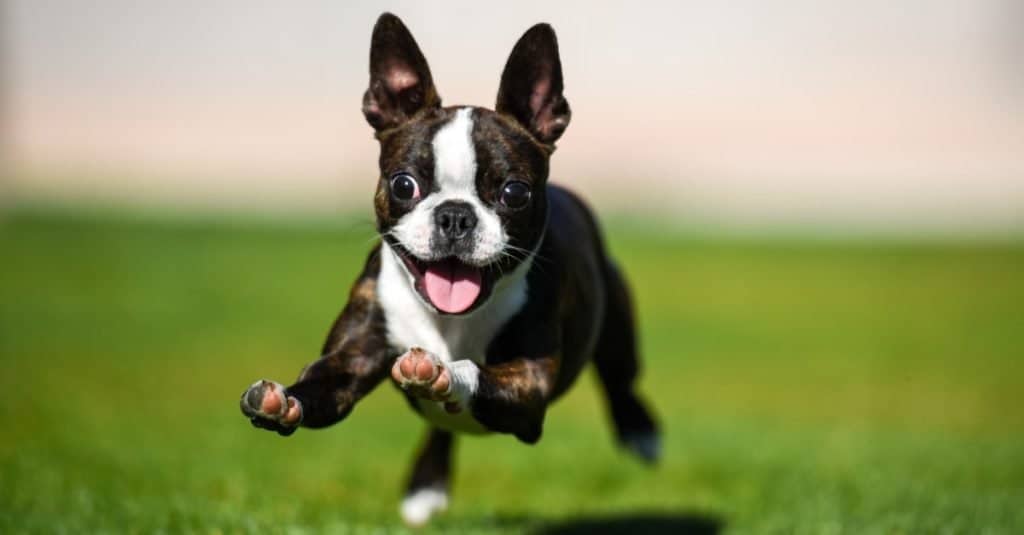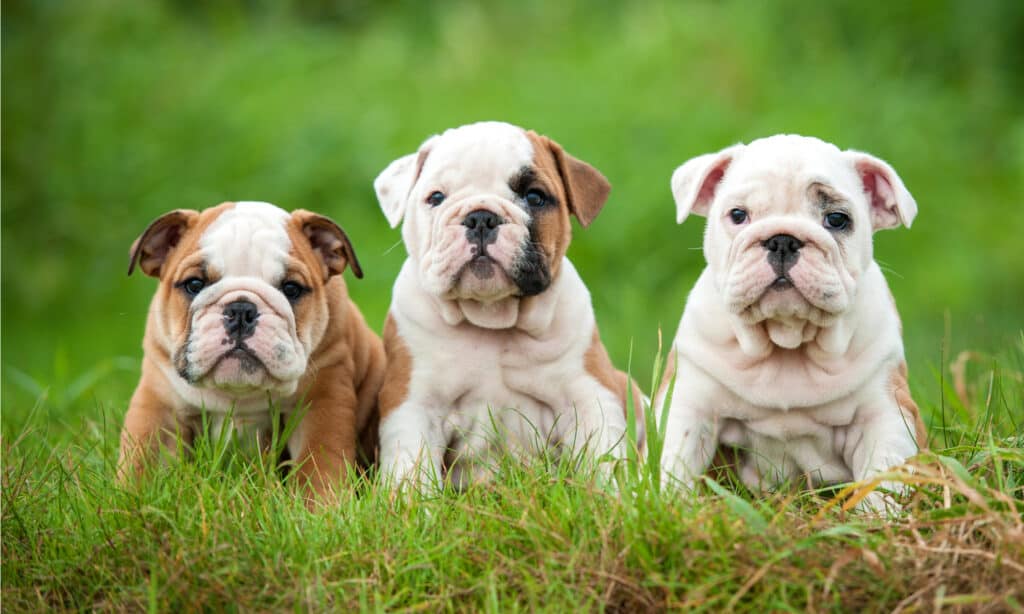Boston terriers and Boston bulldogs, two special breeds with a shared city of origin, have captured the hearts of dog lovers worldwide. While they both boast adorable, friendly natures, these breeds have unique traits that set them apart. This blog post will explore the key differences between the Boston bulldog vs. the Boston terrier. Let’s dig into their history, physical characteristics, and temperament. What distinct features make each breed a beloved canine companion?
Key Difference Between Boston Terrier and Boston Bulldog
| Comparison | Boston Terrier | Boston Bulldog |
|---|---|---|
| Height | 15-17 inches | 15-18 inches |
| Weight | 10-25 lbs. | 20-35 lbs. |
| Coat Type | Smooth, fine, short | Smooth, short, glossy |
| Colors | Black, brindle, or seal (with white) | Black, cream, gold, light brown, and white |
| Temperament | Friendly, lively, affectionate | Affectionate, loyal, people-oriented |
| Social Needs | High; loves being around people and other pets | High; needs company, is loveable and affectionate |
| Life Expectancy | 11-13 years | 8-15 years |
| Common Health Problems | Glaucoma, dental disease, joint problems, patellar luxation, skin allergies | Respiratory issues, hip dysplasia, ear infections, skin fold dermatitis, cherry eye |

Appearance
Boston Terrier vs. Boston Bulldog: Height
Boston terriers, often called the “American Gentleman,” typically stand around 15 to 17 inches tall at the shoulder when fully grown. They are compact dogs, but their stature is proportional, creating a neat and well-balanced appearance.
On the other hand, Boston bulldogs are more sturdy and muscular dogs. They usually stand a bit shorter than their terrier counterparts, averaging about 15 to 18 inches in height at the shoulder. Their broad shoulders and sturdy legs lend them a low-slung and powerful appearance.
Boston Terrier vs. Boston Bulldog: Weight
Boston terriers are generally lightweight and compact, with a weight range typically between 10 and 25 pounds. This size makes them suitable for various living conditions, including apartments and small homes, as they do not require ample space to move around comfortably.
Boston bulldogs, on the other hand, are more substantial in weight, reflecting their stocky and robust physique. An adult Boston bulldog’s weight can range from 20 to 35 pounds. Despite their weight, they are not typically very active dogs and do not require extensive exercise.
These weight ranges are general guidelines, and individual dogs can vary based on diet, exercise, and genetic factors. Always consult a veterinarian or reputable breeder for specific information about a dog’s weight.
Boston Terrier vs. Boston Bulldog: Coat Type
Both of the breeds share similarities in their coat types and some key differences.
Boston terriers have smooth, fine, short, shiny, crisp coats. Boston bulldogs have a coat that is also smooth and short but tends to be thicker and denser compared to Boston terriers.
Regardless of the breed, Boston terriers and Boston bulldogs require regular grooming to keep their coat healthy. Regular brushing can help reduce shedding and keep the skin healthy. As with any breed, regular bathing should be done as necessary, but not so often as to dry out their skin. Always check with your vet for your pet’s best grooming practices.
Boston Terrier vs. Boston Bulldog: Colors
Regarding colors, Boston terriers and Boston bulldogs display a distinct array of coat colors, giving prospective owners a variety.
Boston terriers have a comparatively limited color range. According to the American Kennel Club, their coats are usually black, brindle, or seal (a color that appears black but shows a reddish tone in the sunlight) with white. The white typically appears on the chest, muzzle, and between the eyes, contributing to their distinct and dapper “tuxedo” appearance.
Boston bulldogs have a more diverse color palette. Their coats can come in shades and combinations, including Black, cream, gold, light brown, white, and any combination. They might also have different color patterns, including spots or patches.

Boston terriers’ color range is limited compared to Boston bulldogs.
©Zero Degrees Photography/Shutterstock.com
Characteristics
Boston Terrier vs. Boston Bulldog: Temperant
When discussing temperament, both the Boston terrier and Boston bulldog offer traits that make them lovable companions, but their personalities can differ notably.
Boston terriers are known for their friendly and outgoing nature. They are highly social dogs that enjoy being around people and often get along well with other pets. They’re lively, intelligent, and trainable, making them great family pets. Boston terriers are also known for their sensitivity; they don’t respond well to harsh tones or treatment and thrive in a positive, loving environment.
Boston bulldogs are typically characterized by their calm and dignified demeanor. They’re generally not as active or energetic as Boston terriers. Bulldogs are also known for their stubborn streak, but this can be overcome with consistent, positive reinforcement training methods. Despite their tough exterior, bulldogs are generally gentle, affectionate, and love to lounge around with their owners. They make excellent pets for those seeking a more low-key companion.
Both breeds are typically good with children, making them excellent family dogs. However, every dog’s temperament can be influenced by numerous factors, including heredity, training, and socialization. Meeting a dog to ensure you feel comfortable with their temperament before bringing them into your home is always a good idea.
Boston Terrier vs. Boston Bulldog: Social Needs
The social needs of a Boston bulldog and a Boston terrier differ quite a bit, as they are inherently different in their levels of activity and sociability.
Boston terriers are known for being highly social dogs. They have a friendly nature and generally get on well with other pets. They are quite energetic and enjoy playing and engaging in activities with their owners. Leaving them alone for long periods can lead to anxiety or boredom, which may manifest in undesirable behaviors.
Boston bulldogs are also social, fond of their human companions, and enjoy a good cuddle. They like being part of the family’s daily routine but are typically content to lounge around the house. While they, too, enjoy company, they are often more independent and less likely to experience separation anxiety. However, they still require regular interaction and should not be left alone for extended periods.

Bulldogs are quite social, despite their rugged appearance.
©Rita_Kochmarjova/Shutterstock.com
Health Factors
Boston Terrier vs. Boston Bulldog: Life Expectancy
Life expectancy can vary greatly among dog breeds, and while it’s influenced by various factors, including diet, exercise, and veterinary care, the breed itself plays a significant role.
Boston terriers typically have a life expectancy of around 11 to 13 years. Some can live longer with good care, with some reaching up to 15 years of age. They’re generally healthy, but like any breed, they can be prone to certain health conditions. Regular check-ups with a veterinarian and a healthy diet can help ensure a long, happy life.
Boston bulldogs typically have a shorter life expectancy due to various health issues associated with the breed. On average, their life span ranges from 8 to 15 years. Despite their shorter lifespan, bulldogs can lead happy and fulfilling lives with proper care and regular veterinary check-ups.
Boston Bulldog vs. Boston Bulldog: Health Problems
Boston terriers are generally healthy, but, like all breeds, they’re prone to certain health conditions. These include cataracts, deafness, patellar luxation (knee dislocation), heart murmurs, and allergies. Additionally, like all brachycephalic (short-nosed) breeds, Boston terriers can struggle with breathing issues, especially in hot or humid weather or if they become overweight.
Boston bulldogs, while lovable and popular, are known to have more health problems due to their brachycephalic nature and body structure. They can suffer from respiratory issues, hip dysplasia, heart conditions, and skin infections. Bulldogs are also susceptible to obesity, which can exacerbate these health problems. Due to their unique facial structure, they can also struggle with overheating and must be closely monitored in hot or humid conditions.
Wrapping Up Boston Terrier vs. Boston Bulldog
Boston terriers and Boston bulldogs are both lovable, charming breeds that make great companions. However, they have different life expectancies due to their unique health issues. With regular veterinary check-ups and a healthy diet, your pup can lead a long, happy life regardless of the breed. It’s essential to consider which breed best suits your lifestyle before deciding which one to bring home. Boston terriers and bulldogs are loving, loyal breeds that will make wonderful additions to your family.
The photo featured at the top of this post is ©
Ready to discover the top 10 cutest dog breeds in the entire world?
How about the fastest dogs, the largest dogs and those that are -- quite frankly -- just the kindest dogs on the planet? Each day, AZ Animals sends out lists just like this to our thousands of email subscribers. And the best part? It's FREE. Join today by entering your email below.
Thank you for reading! Have some feedback for us? Contact the AZ Animals editorial team.







